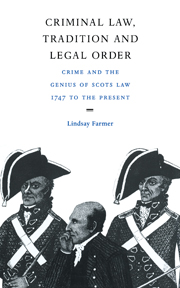Book contents
- Frontmatter
- Contents
- Acknowledgements
- 1 The boundaries of the criminal law: criminal law, legal theory and history
- 2 The genius of our law: legality and the Scottish legal tradition
- 3 The judicial establishment: the transformation of criminal jurisdiction 1747–1908
- 4 The ‘well-governed realm’: crime and legal order 1747–1908
- 5 The perfect crime: homicide and the criminal law
- 6 Conclusion: crime and the genius of Scots law
- Bibliography
- Index
1 - The boundaries of the criminal law: criminal law, legal theory and history
Published online by Cambridge University Press: 08 January 2010
- Frontmatter
- Contents
- Acknowledgements
- 1 The boundaries of the criminal law: criminal law, legal theory and history
- 2 The genius of our law: legality and the Scottish legal tradition
- 3 The judicial establishment: the transformation of criminal jurisdiction 1747–1908
- 4 The ‘well-governed realm’: crime and legal order 1747–1908
- 5 The perfect crime: homicide and the criminal law
- 6 Conclusion: crime and the genius of Scots law
- Bibliography
- Index
Summary
You will permit me however very briefly to describe, rather what I conceive an academical expounder of the laws should do, than what I have ever known to be done … He should consider his course as a general map of the law, marking out the shape of the country, its connexions and boundaries, it's greater divisions and principal cities: it is not his business to describe minutely the subordinate limits, or to fix the longitude and latitude of every inconsiderable hamlet. His attention should be engaged … ‘in tracing out the originals and as it were the elements of the law’.
The need to talk about and establish boundaries is perhaps stronger in relation to the criminal law than any other area of law. The field of criminal law marks itself out by its history of preoccupation with limits – of the law, of the sanction, of criminalisation. These images of space and landscape continue with descriptions of the contours of liability, the field of punishment, the frontiers of criminality, or the territory of the law. It is thus appropriate that we should begin with a passage from Blackstone's Commentaries that recognises, in a particularly elegant manner, the significance of boundaries and divisions. It is rarely referred to now, but Blackstone's exposition of the common law of crime has been of enduring importance to modern ideas about the law.
- Type
- Chapter
- Information
- Criminal Law, Tradition and Legal OrderCrime and the Genius of Scots Law, 1747 to the Present, pp. 1 - 20Publisher: Cambridge University PressPrint publication year: 1996



